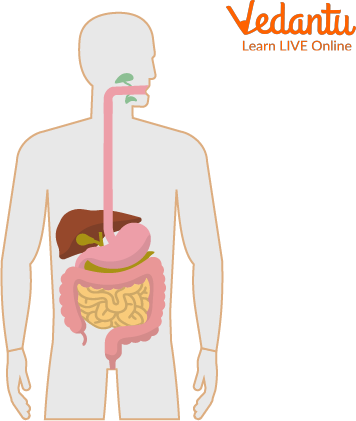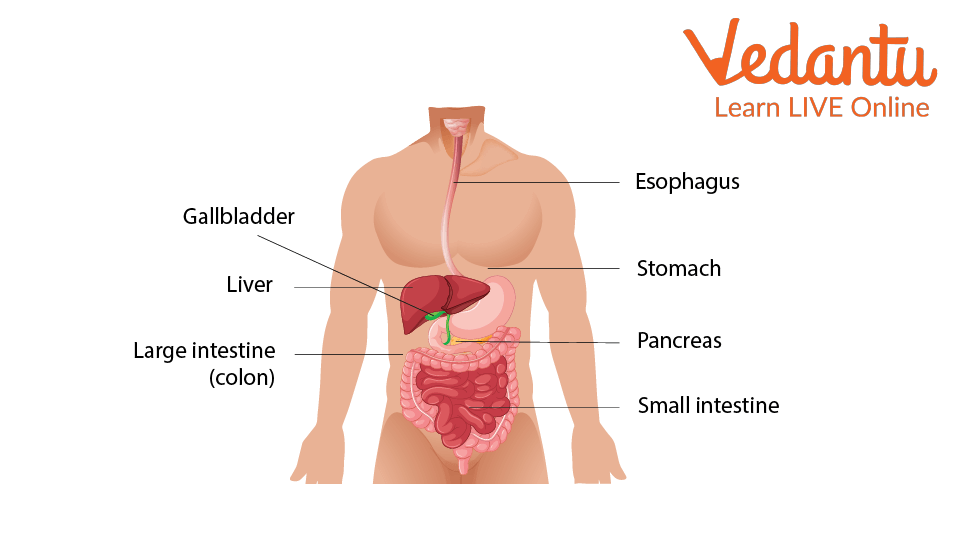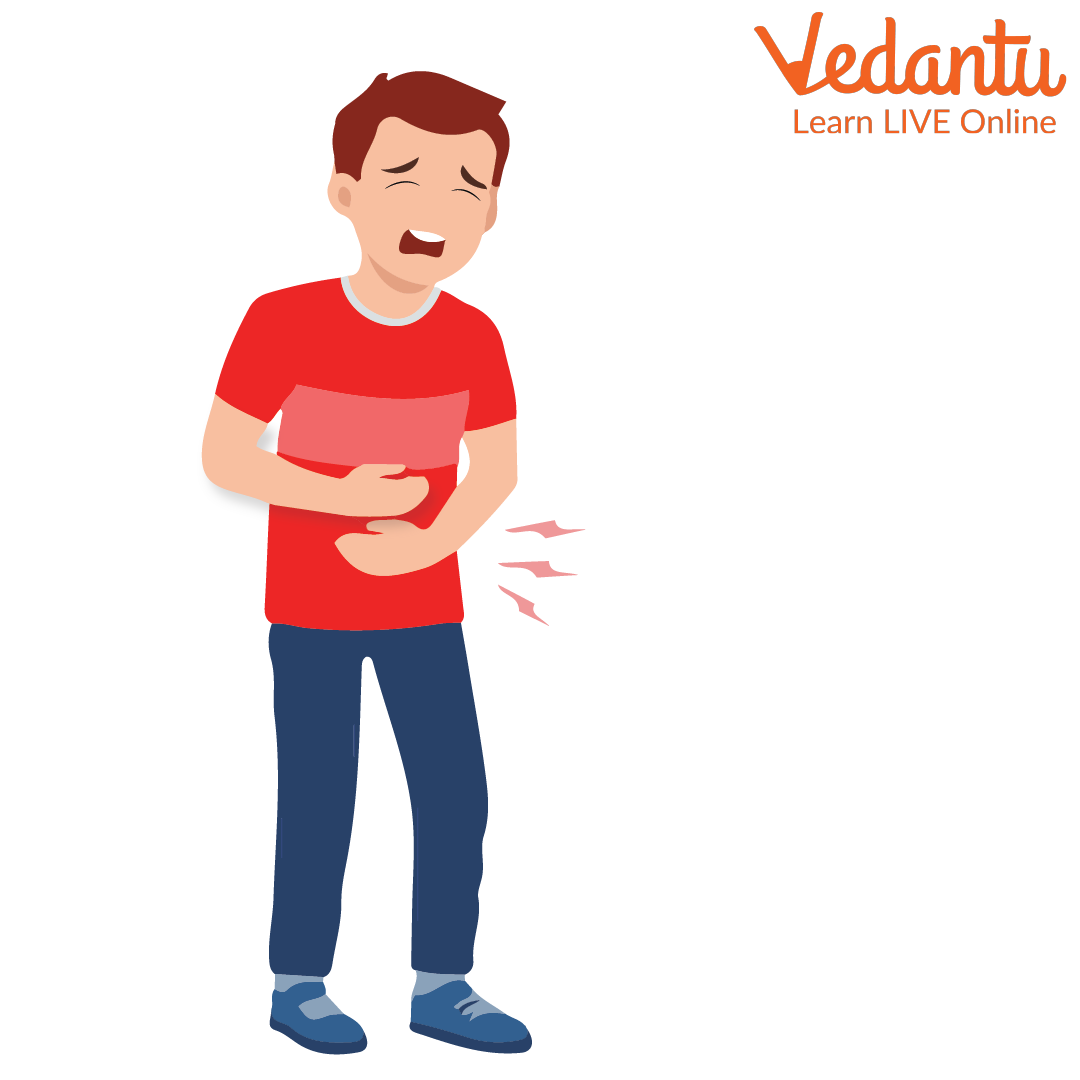




Essential Terms and How the Digestive System Works Explained
Let us begin with what we eat all day long! For breakfast you may have had poha, milk, egg or cereals which contain proteins. For lunch you may have rice, chapati and vegetables which contain carbohydrates, vitamins and calcium. Kids nowadays are very fond of fast foods like noodles, pizzas, fries etc., which contain fats. All of these are nutrients required by the body for its smooth functioning.
The human digestive system breaks the food into various nutrients and minerals, which are absorbed by the body to carry out various activities. Nutrients such as carbohydrates, fats, vitamins etc., are absorbed by the body through the process of digestion. In this article, we will learn about the human digestive system, its functions, and some interesting facts about the digestive system.

The Digestive System
The Human Digestive System
The human digestive system is used to break down the food into simpler substances, until it can be absorbed in the body. This gives the human body energy and growth to work and function properly.
Organs of the Digestive System
The different organs or body parts that are involved in this process make up the digestive system.
In humans, the different parts of the digestive system make up what is called the digestive tract. The digestive tract begins with the mouth and ends at the anus. The main organs of the digestive system are the mouth, the pharynx, the oesophagus, the stomach, and the small and large intestines. The liver, the gallbladder, and the pancreas also help in the process of digestion. They produce substances that break food down into simpler forms.

Parts of the Digestive System
Functions of the Digestive Organs
Have you ever wondered that when you eat something like a pizza, burger, or a piece of cake, where does it go and what happens after you eat your food? Food contains certain complex substances which are difficult for our body to digest and therefore the digestive system helps to break down the food into simpler substances that it can use.
The digestive system takes help and support from its sub-parts to work effectively and efficiently. Let’s have a look at the parts and functions of the digestive organ:
Mouth: When we ingest the food, our teeth break food into small particles and mixes it with liquid substance called saliva. Saliva is formed in our mouth. When we eat, the starch in the food is broken down by saliva, which makes it easier for us to chew and swallow.
Throat (Pharynx): With the help of the tongue, the food is pushed into the mouth and then into the oesophagus.
Oesophagus: The oesophagus is the second part of the process of the digestive system. It pushes the food from the throat to the stomach.
Stomach: The end of the oesophagus is attached to the stomach. It has three important things to do: store the food we eat, break the food into small particles, and finally empty semi-digested food into the small intestine slowly and steadily.
Small Intestine: For the body to get all the vitamins, minerals, and proteins, the small intestine breaks down the food also with the help of other body parts like the pancreas, liver, and gallbladder.
Large Intestine: Once the required nutrients are passed into the blood, the waste that is left behind goes into the large intestine, which is fatter than the small intestine and is also the last step in digesting the food.
Rectum: One last time the large intestine tries to absorb any left nutrients from the food and passes the waste to the rectum, in the form of poop.
Anus: The waste has now taken a solid shape and stays in the rectum till we pass it through the anus.
Problems That Can Affect the Digestive System
Even though the digestive system does a lot of work for our body, it becomes our duty to keep the system healthy and running. Sometimes certain conditions have a small or severe effect on the working of the digestive system. It can be because of bacteria in food, infection, or even stress. Some of the diseases of the digestive system are mentioned below:
Constipation
Diarrhoea
Heartburn
Stomach Flu

Stomach Ache
Fun Facts for Kids
In the above section of the article, we learned about what a digestive system is and how it works. Now let's learn some fun facts about the digestive system:
Did you know that our digestive system starts working and digesting food way before we start eating?
You will be surprised that our gut is about 30 ft or 9 m from mouth to anus, which is the size of a bus.
And it takes about 24 hours for the food that we eat at dinner to cross the 9 m long digestive tract.
It will be hard for you to believe that even if you stand on your head, the food will still reach your stomach.
Though it is called the small intestine, it is as long as 6.5m long.
Both the small and the large intestines together are called ‘bowels.’
You will be amused to know that the shape of the stomach looks like the letter ‘J’.
Summary
To conclude the learnings of the article, we can say that the digestive system is a critical part of our body. Our body won’t be able to get all the right nutrients without the proper functioning of the digestive system. Its primary functions are to mix the food, move the food, and break the food into smaller particles for the nutrients to be absorbed properly by the body.
To be healthy and grow properly, we need to make sure that our digestive system is running smoothly.
FAQs on Fascinating Facts About the Digestive System for Students
1. What is the digestive system in simple words for kids?
Think of the digestive system as a long tube that travels through your body. Its main job is to take the food you eat, like apples and sandwiches, and break it down into tiny fuel particles. Your body then uses this fuel for energy to run, play, and grow.
2. Is it true that our small intestine is actually very long?
Yes, it's one of the most surprising facts! If you were to stretch out an adult's small intestine, it would be around 22 feet long. That's taller than a giraffe! It is coiled up neatly inside our belly to fit.
3. Why does my stomach sometimes make rumbling or gurgling sounds?
Those sounds are completely normal and are a sign that your digestive system is working! The noises are made by your stomach and intestinal muscles squeezing to mix your food with digestive juices. It can happen when you're digesting or even when you're just hungry.
4. How does digestion start even before we take a bite of food?
Your digestive system is very clever. The moment you smell or see delicious food, your brain sends a signal to your mouth to start making saliva (spit). This saliva is the very first step in digestion, getting ready to soften the food as soon as it enters your mouth.
5. Why is chewing our food so important for digestion?
Chewing is a crucial first step for good digestion. When you chew, you break down large food pieces into a soft, mushy pulp. This makes it much easier for your stomach to break the food down further and absorb all the good stuff, called nutrients.
6. What happens to the food that our body cannot digest?
Not everything we eat can be used by our body. The leftover, undigested parts of food travel to the large intestine. Here, water is absorbed, and the remaining waste is packed together to be pushed out of the body when you go to the toilet.
7. How can I help keep my digestive system healthy and happy?
Keeping your digestive system working well is easy. Here are a few simple tips:
- Drink plenty of water throughout the day.
- Eat foods that are high in fibre, like fruits, vegetables, and whole grains.
- Try to chew your food slowly and thoroughly.









